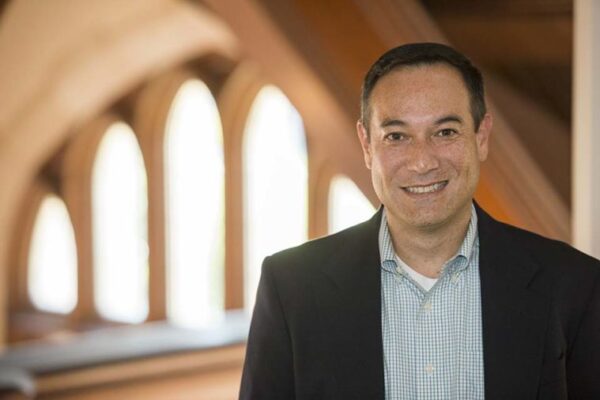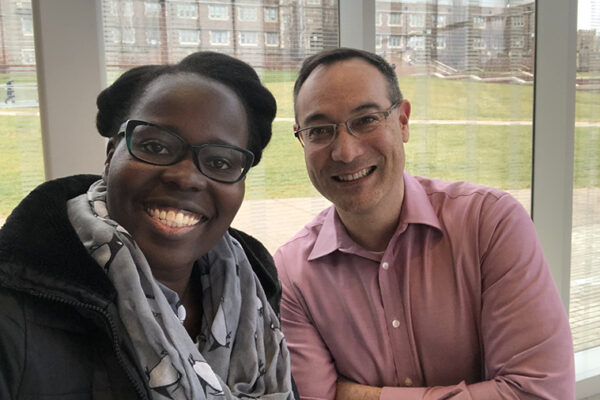Questions about Amy Coney Barrett’s religious affiliation and beliefs have dominated public discourse since President Donald Trump announced that she was his pick to fill the U.S. Supreme Court seat left vacant by Ruth Bader Ginsburg’s passing. While her faith is considered controversial by some, should it impact her confirmation?

John Inazu, the Sally D. Danforth Distinguished Professor of Law and Religion at Washington University’s School of Law and John C. Danforth Center on Religion and Politics, recently wrote in Newsweek about commentary surrounding the religious beliefs of Judge Barrett. Inazu, who also is the co-editor of Uncommon Ground: Living Faithfully in a World of Difference, offered answers to — and insight into — the public’s questions raised by Judge Barrett’s nomination.
Are the religious affiliation and beliefs of a Supreme Court nominee a legitimate reason to oppose the nomination?
No.
Can you elaborate?
For one thing, the Constitution (in Article VI, Section 3) forbids religious tests “as a Qualification to any Office or public Trust under the United States.”
Equating religious affiliations and beliefs with judicial philosophy also misunderstands the nature of judging. For example, Justice Sonia Sotomayor and Judge Barrett are both Catholics, but their judicial philosophies are quite dissimilar.
Does your answer change if the religious values and norms contradict mainstream American values?
No. The problem is twofold. First, outside of a few outlier examples, the meaning of “mainstream” is either deeply contested or hopelessly vague. Second, the less mainstream one’s religious beliefs, the more likely they will be viewed with suspicion and hostility. That’s one reason we have protections for religious freedom and other civil liberties in the first place — to protect unpopular beliefs and practices.
What are legitimate reasons to oppose a Supreme Court nomination?
Generally speaking, I think it’s legitimate to oppose nominees based on jurisprudence, competence or character. In today’s political environment, it’s also a practical reality and generally acceptable to oppose nominees based on their likely or predicted votes on key contested issues. In addition, given the timing of this nomination and earlier actions by Republican senators, there are legitimate reasons to oppose Judge Barrett’s nomination on procedural grounds.
I support Judge Barrett’s nomination and have joined a letter by law professors urging her confirmation. I have many friends and colleagues, whom I respect greatly, who oppose her nomination on procedural or substantive grounds not having to do with religion, and I think it’s appropriate for them to do so.
Republicans have claimed that any discussion of Judge Barrett’s religious beliefs is tantamount to an anti-Catholic attack. Is the “Catholic” label an accurate representation of Judge Barrett’s beliefs?
People of faith reach views about the world based on any number of factors and practices. If Judge Barrett is a member in good standing of the Catholic Church, then I suppose it is accurate to say she is Catholic, in the same way that former Vice President Biden is Catholic. But I think Republicans focusing on Catholicism generally are obscuring meaningful differences arising from Judge Barrett’s affiliation with the People of Praise. The ecumenical group holds unique beliefs and engages in practices that many Catholics do not. Moreover, Catholics can be liberal or conservative in their politics and in their theology. Judge Barrett appears to be conservative in both ways, but many Catholics are not.
What concerns you about the way people are talking about Judge Barrett’s religious beliefs?
I’m concerned for two independent reasons. First, I believe that Democratic senators raised inappropriate questions and comments during Judge Barrett’s 2017 confirmation hearing. California Democratic Sen. Dianne Feinstein’s comment “The dogma lives loudly within you” is the most well-known example, but other senators also badgered Judge Barrett about her faith in ways that suggested intolerance or disdain for her religious beliefs. I think there is a good chance that we will not see this kind of grandstanding in the upcoming hearings, in part because of the widespread and bipartisan backlash to Sen. Feinstein’s comment, and in part because former Vice President Biden is modeling appropriate restraint toward this line of inquiry.
My second concern is that national coverage of the People of Praise — from The New York Times, Politico, Newsweek and others — has been irresponsible, inaccurate, and, in some cases, borderline bigoted. As I wrote in my own piece for Newsweek, the practices of oath-taking, accountability and submission to authority by the People of Praise are “entirely commonplace across a variety of religious practices.” That doesn’t mean that most Catholics take them as seriously as Judge Barrett. But it is to say that many religious believers across a variety of Christian and non-Christian faiths engage in similar practices.
“If Judge Barrett testifies that she will follow the judicial oath and that she will recuse herself if that is not possible, that should be the end of the matter.”
John Inazu
Because these practices involve oath-taking and submission to authority, it’s appropriate for politicians and commentators to ask whether Judge Barrett’s religious beliefs create any tensions with her obligation to fulfill the judicial office and its attendant judicial oath. But this inquiry should be limited. If Judge Barrett testifies that she will follow the judicial oath and that she will recuse herself if that is not possible, that should be the end of the matter.
Do you think the conversation would be different if she were Jewish, Muslim or Hindu?
Almost certainly. President Trump and a number of past and current Republican officials — including Ben Carson, Frank Gaffney and others — have demonstrated unfamiliarity, hostility and bigotry toward people of other faiths, particularly Muslims. I think we would see immense hostility from the right if a Democratic administration nominated a Muslim to the Supreme Court. And anyone presently weighing in against the inappropriate focus on Judge Barrett’s faith who would not do the same when it comes to similar attacks against Muslim officeholders shows their own self-interest and hypocrisy. As Eboo Patel has recently argued, Americans of all kinds should develop “an interfaith literacy about their own nation and its remarkably varied citizens to welcome whatever religious or philosophical conviction the nominee brings, and focus their fights on politics rather than faith.”
Is there anything else you would like to add?
I agree with my colleague Dan Epps that our political process has vested far too much power in the Supreme Court, and I hope that we can work toward serious bipartisan reform proposals along the lines that he and others have suggested.
I’ll also add that as a Christian, I have been dismayed at the naive hope that too many of my fellow Christians have placed in the Supreme Court, including as their primary justification for their support of President Trump. It seems fairly obvious to me that the Christian faith warns against such misplaced trust, but I suppose that is harder to see when Christians are asked to “fix our eyes on Old Glory.”

